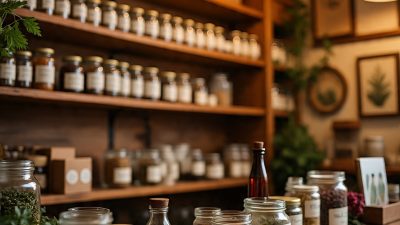We’ve all experienced it—bloated belly, stomach cramps, or that sluggish, heavy feeling after eating. While occasional indigestion is normal, frequent discomfort is a sign your digestive system needs support.
Fortunately, you don’t need expensive supplements or medications to feel better. One of the gentlest and most effective ways to support gut health is with DIY herbal teas to improve digestion naturally.
In this guide, you’ll learn:
- Which herbs support digestion
- How to make your own herbal tea blends at home
- When and how to drink them
- Specific tea recipes for bloating, gas, constipation, and more
Let’s sip our way to better gut health—naturally.
Read : Top Natural Remedies for Gas and Bloating at Night
Contents
- 1 Why Herbal Teas Are Great for Digestion
- 2 Best Herbs for Digestive Health
- 3 1. Peppermint Tea – For Gas and Cramping
- 4 2. Ginger Tea – For Sluggish Digestion and Nausea
- 5 3. Fennel Tea – For Bloating and Post-Meal Gas
- 6 4. Chamomile Tea – For Nervous Stomach and Inflammation
- 7 5. Dandelion Root Tea – For Liver and Bile Support
- 8 6. Ginger-Fennel-Peppermint Blend – All-in-One Digestive Tonic
- 9 7. Soothing Gut-Coating Tea – For Acid Reflux and Irritation
- 10 8. Lemon Balm and Caraway Tea – For IBS and Nervous Tension
- 11 How to Make Your Own Digestive Tea Blends at Home
- 12 When to Drink Herbal Teas for Digestion
- 13 Pro Tips for Better Digestion with Herbal Teas
- 14 Who Should Be Cautious
- 15 Final Thoughts
- 16 FAQ
Why Herbal Teas Are Great for Digestion
Herbal teas have been used for centuries in Ayurveda, Traditional Chinese Medicine, and Western herbalism to:
- Relieve gas and bloating
- Soothe stomach cramps
- Stimulate bile and enzyme production
- Reduce nausea and indigestion
- Calm inflammation in the gut
- Support the gut-brain axis (your mood impacts digestion!)
Plus, herbal teas are caffeine-free, hydrating, and easy to prepare at home.
Best Herbs for Digestive Health
Before we dive into DIY recipes, here are the top herbs used to improve digestion naturally:
| Herb | Digestive Benefit |
|---|---|
| Peppermint | Relaxes intestinal muscles, reduces gas |
| Ginger | Anti-inflammatory, stimulates digestion |
| Fennel | Eases bloating, gas, and indigestion |
| Chamomile | Calms the gut and mind |
| Dandelion root | Supports liver and bile flow |
| Licorice root | Soothes stomach lining, reduces heartburn |
| Lemon balm | Calms cramps and supports gut-brain connection |
| Caraway seeds | Relieves gas and stomach pain |
| Marshmallow root | Coats the stomach, reduces irritation |
1. Peppermint Tea – For Gas and Cramping
Peppermint is one of the most well-known herbs for digestion. Its natural menthol relaxes the gastrointestinal tract, which helps relieve gas, bloating, and spasms.
Ingredients:
- 1 tablespoon dried peppermint leaves (or 3–4 fresh sprigs)
- 1.5 cups hot water
Instructions:
- Steep peppermint in hot water for 5–10 minutes.
- Strain and sip warm after meals.
Best For: Gas, bloating, IBS, post-meal cramps
2. Ginger Tea – For Sluggish Digestion and Nausea
Ginger is a powerhouse herb that stimulates saliva, bile, and gastric enzymes. It’s especially helpful after heavy meals or when you feel nauseous or sluggish.
Ingredients:
- 1–2 inches fresh ginger, sliced or grated
- 2 cups water
- Optional: honey, lemon
Instructions:
- Boil ginger in water for 10–15 minutes.
- Strain and add honey or lemon if desired.
Best For: Indigestion, nausea, cold digestion, post-meal heaviness
3. Fennel Tea – For Bloating and Post-Meal Gas
Fennel seeds have carminative properties, meaning they reduce gas formation in the gut. It’s a favourite after large or gassy meals.
Ingredients:
- 1 teaspoon crushed fennel seeds
- 1.5 cups boiling water
Instructions:
- Steep for 10 minutes, covered.
- Strain and sip warm.
Pro Tip: Chew on fennel seeds after meals for extra relief.
Best For: Gas, bloating, baby colic, indigestion
4. Chamomile Tea – For Nervous Stomach and Inflammation
Chamomile isn’t just a sleep aid—it also calms the gut lining and reduces inflammation. Great for those with a nervous stomach or stress-induced bloating.
Ingredients:
- 1 tablespoon dried chamomile flowers
- 1.5 cups hot water
Instructions:
- Steep for 5–8 minutes.
- Strain and drink before bed or after meals.
Best For: Stress-related indigestion, gut inflammation, insomnia
5. Dandelion Root Tea – For Liver and Bile Support
Healthy digestion depends on proper bile flow. Dandelion root stimulates liver and gallbladder function, helping break down fats and promote regularity.
Ingredients:
- 1 tablespoon roasted dandelion root
- 2 cups water
Instructions:
- Simmer root in water for 15 minutes.
- Strain and enjoy before meals.
Best For: Fatty meal digestion, sluggish bowels, detox support
6. Ginger-Fennel-Peppermint Blend – All-in-One Digestive Tonic
Combine these three superstar herbs for a well-rounded digestive tea.
Ingredients:
- 1 tsp grated ginger
- 1 tsp crushed fennel seeds
- 1 tsp dried peppermint
Instructions:
- Steep all ingredients in 2 cups hot water for 10 minutes.
- Strain and drink slowly.
Best For: Gas, bloating, cramps, poor digestion
7. Soothing Gut-Coating Tea – For Acid Reflux and Irritation
This tea uses herbs that soothe and protect the digestive tract, ideal for those with reflux, ulcers, or a sensitive stomach.
Ingredients:
- 1 tsp marshmallow root
- 1 tsp licorice root (DGL form for safety)
- 1 tsp chamomile
Instructions:
- Steep in hot (not boiling) water for 10 minutes.
- Drink before meals or before bed.
Best For: Reflux, gastritis, sensitive gut
8. Lemon Balm and Caraway Tea – For IBS and Nervous Tension
This blend supports the gut-brain axis, helping relieve digestion troubles caused by stress, anxiety, or tension.
Ingredients:
- 1 tsp dried lemon balm
- 1 tsp crushed caraway seeds
Instructions:
- Steep in hot water for 8–10 minutes.
- Sip before or after meals.
Best For: IBS, nervous stomach, bloating from stress
How to Make Your Own Digestive Tea Blends at Home
Mix and match your favourite herbs to create personalized herbal tea blends:
Base Herbs (Pick 1–2):
- Peppermint
- Chamomile
- Ginger
Support Herbs (Pick 1–2):
- Fennel
- Lemon balm
- Caraway
Deep Support (Optional):
- Dandelion root
- Licorice root
- Marshmallow root
Store dried herbs in airtight jars in a cool, dry place. Use 1–2 teaspoons per cup of hot water, steep for 5–10 minutes, and enjoy.
When to Drink Herbal Teas for Digestion
| Time | Tea | Purpose |
|---|---|---|
| Before meals | Dandelion, Ginger | Stimulate digestion |
| After meals | Peppermint, Fennel | Reduce gas, cramps |
| Evening | Chamomile, Lemon balm | Calm gut and mind |
| Before bed | Marshmallow root, Chamomile | Soothe inflammation |
Pro Tips for Better Digestion with Herbal Teas
- Don’t chug: Sip your tea slowly. It allows herbs to absorb and encourages mindful eating.
- Be consistent: Drink daily for a few weeks to see real gut improvements.
- Add lemon or honey for taste and added health benefits.
- Avoid sugar: It cancels out many of the benefits. Use raw honey sparingly if needed.
- Test tolerance: Start with a small amount if you’re new to a herb.
Who Should Be Cautious
- Pregnant or breastfeeding women: Check herb safety (e.g., avoid too much peppermint or licorice).
- People with ulcers or reflux: Use non-spicy herbs like chamomile or marshmallow root.
- Medication interactions: Herbs like ginger or dandelion may interfere with blood thinners or diuretics.
Always consult your doctor or a qualified herbalist if unsure.
Final Thoughts
Digestive issues don’t have to be your norm. With simple, DIY herbal teas to improve digestion naturally, you can soothe your gut, support nutrient absorption, and reduce discomfort—all while enjoying a warm, calming ritual.
Try one new tea each week. Pay attention to how your body responds. Over time, you’ll not only improve digestion but also increase your connection with what your body needs.
FAQ
What are the best herbs to use in DIY teas for digestion?
Some of the best herbs for digestive health include ginger, peppermint, fennel, chamomile, dandelion root, and licorice root. These herbs help soothe the stomach, reduce bloating, and support overall gut function.
How does herbal tea help with digestion?
Herbal teas can relax the digestive tract, reduce gas and bloating, stimulate bile flow, and ease inflammation in the gut. Many herbs also have natural carminative and antispasmodic effects.
When is the best time to drink herbal tea for digestion?
The best times are after meals to help with digestion or before bed to reduce bloating and support overnight gut repair. Morning teas can also stimulate digestive enzymes and metabolism.
Can I combine herbs in one tea blend?
Yes, combining herbs like ginger and peppermint or chamomile and fennel can enhance both flavour and digestive benefits. Just be sure the herbs work well together and suit your health needs.
Are there any side effects of drinking herbal teas for digestion?
Most people tolerate digestive herbal teas well, but excessive consumption or certain herbs may cause side effects like heartburn or interact with medications. Always consult a healthcare provider if unsure.
How often should I drink herbal tea to improve digestion naturally?
Drinking herbal tea 1–3 times daily can naturally support digestion, especially when consumed regularly as part of a balanced lifestyle and diet.


